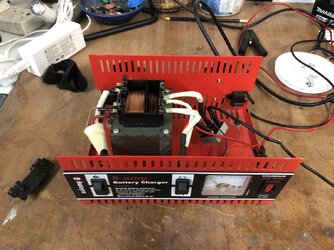Proto
Legendary Member
- Location
- East Devon/West Dorset
Checked the output voltage on a battery charger I've had for a while and I'm getting 10.8 volts. I'm assuming I should be getting 14v or so.
I've opened it up to see if I can see anything obviously wrong and there's not a lot in there - a transformer, a bridge rectifier and a 6v/12v, plus a high/low charging switch.
Can't see any discolouring or damage to the transformer so I'm guessing it's working okay, which really only leaves the rectifier. Now, disclaimer, I know nothing about electronics, but is it possible that the rectifier is faulty causing the low output?
New rectifier easy to source, and I'm loath to chuck something away that can be repaired.
Anyone able to advise?
I've opened it up to see if I can see anything obviously wrong and there's not a lot in there - a transformer, a bridge rectifier and a 6v/12v, plus a high/low charging switch.
Can't see any discolouring or damage to the transformer so I'm guessing it's working okay, which really only leaves the rectifier. Now, disclaimer, I know nothing about electronics, but is it possible that the rectifier is faulty causing the low output?
New rectifier easy to source, and I'm loath to chuck something away that can be repaired.
Anyone able to advise?

